Join us in the park for an outdoor showing of “A Bug’s Life.” The movie will begin after sunset, approximately 7:00 p.m.
Bring your lawn chair or blanket and a flashlight.
Join us in the park for an outdoor showing of “A Bug’s Life.” The movie will begin after sunset, approximately 7:00 p.m.
Bring your lawn chair or blanket and a flashlight.
Join the Dorey Park Farmer’s Market for an evening concert series featuring some of the best local bands in RVA!
Free Admission! Food & Drink sales onsite. Bring a chair or blanket
Gates open at 6pm. Music begins at 7pm.
June 10: Music by Full Moon Fever
July 8: Music by The Mighty Good Times
Aug 12: Music by Jacob Paul Allen
Sept 9: Music by Legacy Band
Come out to the lawn at The Springs for a concert full of fun songs performed by the Henrico Concert Band under the direction of Randy Abernathy.
Bring your lawn chair or blanket for a relaxing evening of music. Information: 501-5859 or [email protected]
Join the Dorey Park Farmer’s Market for an evening concert series featuring some of the best local bands in RVA!
Free Admission! Food & Drink sales onsite. Bring a chair or blanket
Gates open at 6pm. Music begins at 7pm.
June 10: Music by Full Moon Fever
July 8: Music by The Mighty Good Times
Aug 12: Music by Jacob Paul Allen
Sept 9: Music by Legacy Band
Join us in the park for an outdoor showing of “The Lost World: Jurassic Park.” The movie will begin at sunset, approximately 8:15 p.m.
Bring your lawn chair or blanket and a flashlight. Concessions will be available for purchase.
Join us for our second annual National Night Out in partnership with Speaking Spirit Ministries. This community-building event promotes police partnerships and community organizations as we unite for a great evening of fun! Activities include inflatables, train rides, sports in the gym, dancing, vendors, and more! Information: [email protected]
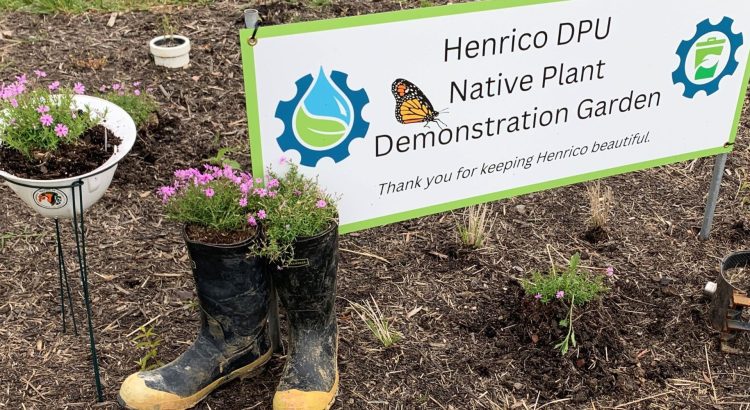
In recent years, everyone from avid gardeners to those who like to fill a few flowerpots has noticed expanding areas in local nurseries for plants called “natives.” Those of us who keep up with gardening trends in the news have noticed increased articles that extoll the benefits of “less yard, more natives.” Some of us even see signs in our neighbors’ yards that signify “Native Plant Pollinator Garden” or “Native Plants Live Here.” So, what is all this fuss about native plants, and why do you keep hearing about them? A few key factors make these plants unique and, to some, indispensable. But before we consider the benefits of planting natives, let’s define what a native plant is and is not.
What is a native plant?
In simple terms, a native plant is one that occurred in the region before the time of the first English settlers. Native plants evolved with the climate, soil, and the fluctuations of the ecosystem they support. For example, our native honeysuckle (Lonicera sempervirens) has bright pink flowers, is not too aggressive, and attracts hummingbirds and other pollinators. However, you may be more familiar with the honeysuckle vine with light yellowish flowers, which is actually an example of a nonnative plant (Lonicera japonica). Lonicera japonica is an invasive plant that can strangle and smother small trees and shrubs.
What are the benefits of planting natives?
Because native plants evolved in certain regions (with local climate stressors), they need less water than nonnative plants and usually do not require fertilizer. In Virginia, we have native plants that do well with our clay soil while surviving the harshest of our summer days and the spontaneous freezing cold snaps we get in the winter. In gardens, native plants use fewer resources (from humans) to survive than beautiful English Roses trying to make it in a foreign land. In addition to these benefits, native plants tend to have longer and more robust root systems than some commonly used nonnative landscape plants. Turf grass is an example of one of our favorite shallow-rooted nonnatives. In the stormwater world (shout out to all the MS4 coordinators in the county), turf grass can be problematic because its shallow roots don’t create pathways in our dense clay soil. Stormwater from large and fast-moving storms doesn’t readily permeate the soil under turf. Conversely, a native plant meadow slows down water and increases the soil’s ability to absorb it. Native plants are good for watershed management.
Native plants support native wildlife.
Maybe the biggest (or at least the most fun) benefit of native plants is the fact that they support the animals and insects that make up our local ecosystems. Our local flora and fauna evolved together over time, so it makes sense that they support each other. If you visited the first annual native plant festival at Dorey Park last spring, you might have heard author and professor Doug Tallamy speak.
One of his most cited studies involves cataloging the number of caterpillars it takes for a chickadee pair to rear their young. Shockingly, chickadees require between 6,000 to 9,000 caterpillars to feed their babies. Yikes! While some nonnative plants provide food for caterpillars, most native caterpillars only eat native plants. Native plants are critical to maintain our local food webs. If you like birds and want to support them, native plants are the way to go.
Monarchs are in the news.
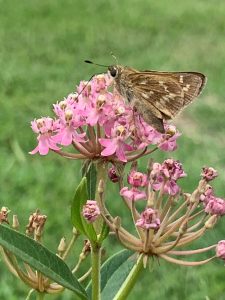 If you are familiar with the beautiful and striking monarch butterfly, you may have already realized the connection between native plants and native insects. The monarch butterfly was recently in the news when the International Union for Conservation of Nature added it to its list of endangered species.
If you are familiar with the beautiful and striking monarch butterfly, you may have already realized the connection between native plants and native insects. The monarch butterfly was recently in the news when the International Union for Conservation of Nature added it to its list of endangered species.
The monarch butterfly only lays its eggs on milkweed, which is the native plant that is host to its caterpillar. Since milkweed thrives on roadsides and field edges, which are often mowed or sprayed with pesticides, it is easy to see why the monarch population is dwindling. Therefore, planting native milkweed will support the existence of this striking insect.
You can reap the rewards.
Certainly, there isn’t enough room in this article to explore all the wonders of native plants; there are, however, benefits to bringing these local stars into your space. It’s no secret that being outdoors and enjoying nature is good for our physical and mental health. Learning something new and knowing you are supporting our ecosystem adds a little spark to our busy days. Enjoying the plants in your space and observing the animals and insects that come along with them, can connect you to nature in ways you may not have thought of before. You may even download a free app (like Seek) that will help you identify plants or join a Land Lovers Series presentation to learn more.
You are invited!
We invite you to visit our new Native Plant Demonstration Garden, which is located on the left side of the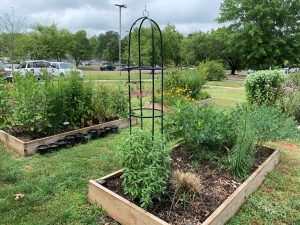 Public Utilities Building in the Woodman Road Complex. While it is still in its infancy, you may benefit from stepping away from your desk to get a first-hand view of some of our pollinator friends in action. One of our co-workers recently asked, “When do the butterflies come?” Unfortunately, we must wait quite a bit longer for that. Last year we saw all the monarch action in late September and early October. Come by then, and you might see monarch caterpillars feed on milkweed, climb the building looking for a place to form their chrysalis, or even see a monarch emerge as an adult and dry its wings!
Public Utilities Building in the Woodman Road Complex. While it is still in its infancy, you may benefit from stepping away from your desk to get a first-hand view of some of our pollinator friends in action. One of our co-workers recently asked, “When do the butterflies come?” Unfortunately, we must wait quite a bit longer for that. Last year we saw all the monarch action in late September and early October. Come by then, and you might see monarch caterpillars feed on milkweed, climb the building looking for a place to form their chrysalis, or even see a monarch emerge as an adult and dry its wings!
More information:
Plantvirginianatives.org is a great resource to learn about native plants. There you will find free downloadable guides for most regions in Virginia. They also list nurseries in the area that sell native plants.
You can also visit the Virginia Native Plant Society at https://vnps.org/.
If in-person learning is more your style, visit the Plant Native! Festival at Crump Park on Saturday, October 21st, from 10 am – 1 pm. This festival will be presented by Keep Henrico Beautiful and Henrico County Recreation and Parks.
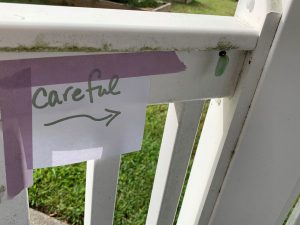
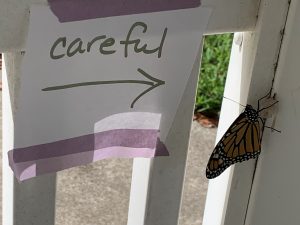
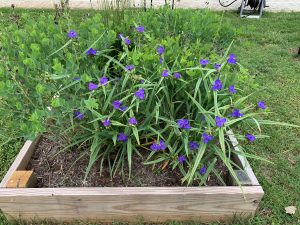
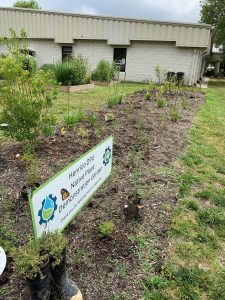
Join the Dorey Park Farmer’s Market for an evening concert series featuring some of the best local bands in RVA!
Free Admission! Food & Drink sales onsite. Bring a chair or blanket
Gates open at 6pm. Music begins at 7pm.
June 10: Music by Full Moon Fever
July 8: Music by The Mighty Good Times
Aug 12: Music by Jacob Paul Allen
Sept 9: Music by Legacy Band

Note from the Editor:
This article references the “History in Focus” program hosted by the Department of Recreation and Parks in conjunction with two Human Resources Division: DEI and Organizational Learning and Talent Development (OLTD). The course catalog listed the following description: Each year, Henrico honors two very important dates in our nation’s history – Juneteenth and July 4th. Both represent America’s foundational values of freedom and equality. Do we celebrate our achievements or commemorate the beginning of an ongoing journey? Or can we do both? Knowing our history and the impact of events from the past is essential to understanding where we are today. As individuals with unique backgrounds, the more we acknowledge and embrace the diversity in our community, the more we progress as a society. Come join us for candid, interactive storytelling and discussion of this complex, trailblazing, and still relatively young country we all call home.
____________
We were fortunate to host our first “History in Focus” program in March. It was quite the learning experience, and we, as facilitators, learned just as much from the attendees as we could provide them. The virtual program was very well attended and, from our perspective, a success! We were so pleased that the participants were eager for this information, and they brought up crucial points that we will incorporate into historical displays and programming moving forward. For some time now, our staff has wanted to share with co-workers and colleagues the rich insights that are found in our history, whether it is local, state, or national.
Since COVID, the extended work-from-home experience, and the period of social protest nationwide, the Division of Recreation and Parks history staff has searched for ways to use programming and dialog to help give our audiences perspective. When you can see from letters, photographs, and journals of 1918 just how deeply the Influenza Epidemic impacted Virginians, we as a community can take solace in the fact that “this too shall pass.” These words from a 13th-century Persian poet were used in a speech by President Abraham Lincoln at the close of the Civil War. History teaches us that the American journey has been and continues to be challenging and complex.
There are not always simple answers to issues we face as a society. For every story of our past that is recorded in history textbooks, there are multiple narratives that go largely unexplored and even less available to be taught in schools.
Our team believes that social and civic progress can be made through conversations about our total history, whether triumphant or tragic. Henrico County is full of stories about individuals, places, and events that have shaped our community’s growth and development and contributed to the history of the state and nation. Sharing the lesser-known stories about our collective heritage as Americans can teach us how others who don’t look like us have succeeded and endured. Our experiences shape us, and learning about the experience of others creates understanding and empathy.
As public servants, we work daily to provide for the needs of our constituents whose life history and ancestry have shaped their worldviews. Regardless of the county division/department we represent, we must provide assistance without judgment. For those who look for historical equivalents in contemporary situations, we can see and take pride in our progress as a society. We can also see areas where we can do better. As students of history, we can also recognize essential elements of human nature that contribute to our survival. Adapting to the unexpected and the compassion to help those in need have been pervasive throughout history.
We look forward to the opportunity to participate in more classes to share the lessons of the past as we face the challenges of the future.